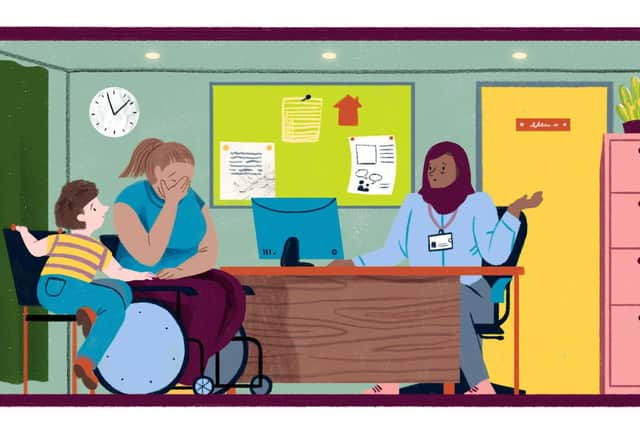Housing benefit claimants being priced out of Leeds


Rising rents and a “disastrous” benefit freeze have meant fewer and fewer affordable properties every year and, on top of that, many landlords are refusing to let homes to benefit claimants, according to research by the Bureau of Investigative Journalism.
Advertisement
Hide AdAdvertisement
Hide AdCharities said families were missing meals and not heating their home in order to keep a roof over their heads as they urged the government to tackle the issue.


Polly Neate, chief executive of Shelter, said: “The freeze on housing benefits has been truly disastrous. People up and down the country are having to make impossible decisions on whether to cut back on food for their family or heat their home just to make up the shortfall between their benefit and rent.
“In the worst case scenario, families are facing homelessness simply because there is nowhere they can afford to live.”
Less than 7 per cent of two-bed properties in Leeds are affordable, according to the research, and there are some areas in the city with almost no affordable properties for housing benefit recipients. This totalled only 52 properties.
Advertisement
Hide AdAdvertisement
Hide AdElsewhere in Yorkshire, York had seven, Richmond and Hambleton had nine and, shockingly, of 63 two-bed listings in Scarborough, only one was affordable to someone on housing benefit.
The best place to find a home for those in receipt of housing benefit in Yorkshire was Bradford, where more than 18 per cent of two-bed properties were affordable. However, this still amounted to only 70 two-bed homes across the whole city, which has nearly 40,000 housing benefit claimants.
Housing benefit, otherwise known as the local housing allowance, was frozen as part of the government’s austerity policy in 2016. The allowance was supposed to cover the cheapest 30 per cent of the local rental market, however, since the freeze rents in the region have kept rising.
Advertisement
Hide AdAdvertisement
Hide AdJon Sparkes, chief executive of Crisis, said "This investigation paints a clear picture that for the overwhelming majority, we're not meeting this basic human need. This is simply unacceptable - we can and must do better.
"We can't let individuals shoulder this burden simply because housing benefit hasn’t kept up with rising rents.”
Non-profit organisation the Bureau of Investigative Journalism collected the details of 62,695 two-bed rental properties across England, Wales and Scotland that were advertised on a single day. Journalists also called almost 200 landlords and discovered the vast majority would not let to housing benefit tenants.
Advertisement
Hide AdAdvertisement
Hide AdOf those that would, many asked for families to fulfil further conditions, such as paying six months’ rent in advance or providing a guarantor. One property site asked for a week’s rent in advance to even talk to the landlord.
Ms Neate said these practices were “discriminatory and unlawful”.
She added: "If this government is serious about tackling homelessness, it is not enough to just lift the freeze, as it has said it will. It must also increase housing benefit rates to ensure they cover at least the bottom third of the rental market across the country so people can retain their homes and avoid becoming homeless."
A Government spokesperson said: “Providing quality and fair social housing is an absolute priority. The Government increased more than 360 Local Housing Allowance rates this year, by targeting extra funding at low-income households.
Advertisement
Hide AdAdvertisement
Hide Ad“We’re investing over £9bn in affordable housing and an additional £2bn after 2022. And we have abolished the Housing Revenue Account borrowing cap – giving councils across the country the tools they need to deliver a new generation of affordable housing.”